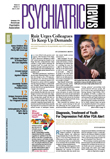After years of excelling as a pipe organist and earning a degree in music from Wellesley College, Carolyn Robinowitz began to hear a new tune from the muse in her head: perhaps there was a different instrument that she could use to touch the lives of others.
Indeed, there was—and it turned out to be a career in medicine and eventually psychiatry.
While the field of music may have lost a major professional talent, the field of psychiatry and an untold number of mentally ill individuals of all ages have benefited from her decision. Now in her latest leadership role in psychiatry as incoming president of APA, she has set even more challenges not only for herself, but for her fellow psychiatrists as well.
In a speech last month in the Opening Session of APA's 2007 annual meeting in San Diego, Robinowitz praised outgoing APA President Pedro Ruiz, M.D., as“ amazing, brilliant, and energetic” and urged the psychiatrists in the audience to keep the momentum going by being active advocates for their profession and their patients. Doing so is imperative, Robinowitz observed, because psychiatry faces a dichotomy of “the best of times and worst of times.”
On the positive side, she said, are the advances in science that have pushed psychiatry forward so that it now provides a wide array of psychotherapy and psychopharmacologic treatments that have been proven effective. Moreover, she continued, research has demonstrated that treatment of mental illness is cost-effective by lowering health care expenditures in general and keeping workers employed and productive. In contrast, untreated mental illness has been estimated to cost the U.S. economy $204 billion a year. Thus, adding mental health coverage to existing health insurance coverage is a sound investment and has been found to increase premiums by less than 1 percent—“pennies to do the right thing.”
The alliances that APA has developed with patient advocacy groups, such as the National Alliance on Mental Illness, Mental Health America, and the Depression and Bipolar Support Association, are another plus for psychiatry. These alliances, Robinowitz noted, “have enhanced our strength and credibility in promoting greater research funding and adequate care. Working together has made this a patient issue, not just guilds promoting their pocketbooks. Policymakers are attentive to personal stories and are now much more appreciative of the impact of mental disorders and the need for care and cure.”
Also, she continued, the willingness of celebrities to share their stories of mental illness and recovery has helped reduce stigma by bringing mental illness out of the closet and proving that treatment works.
Nonetheless, Robinowitz said, the negatives that psychiatry faces have hobbled its ability to deliver care because of poor public policy and ever-dwindling resources. Among the consequences she noted: 47 millions Americans have no health insurance, and 25 million Americans are underinsured because of discriminatory coverage of psychiatric treatment; growing numbers of mentally ill individuals are incarcerated in jails and prisons; the decline in antidepressant prescriptions following the FDA's addition of warnings to antidepressant labeling has been linked to a rise in suicide; managed care continues to emphasize short-term savings over long-term costs and patient distress; and Scientologists' antipsychiatry messages undermine psychiatry's credibility.
“Sadly, we contribute to the problems,” Robinowitz told her audience. “How often and loudly do we speak, and do we speak effectively with one voice?
“We—psychiatrists—are the only professionals that can integrate the needs of patients and our care systems. We are the only people who can provide access to care, assess the care, and ensure quality. We are the only professionals trained in both the biological and psychological workings of the brain, mind, and body,” she said to applause. “Thus, we have an intellectual as well as moral authority to commit to our core professional values and protect our patients without being paternalistic or maternalistic.”
How can individual psychiatrists recommit to advocating for patients?“ First,” she said, “we must be members of APA.” The APA leadership and staff, she noted, cannot succeed without the active involvement of psychiatrists as members of their professional organization.
“Dissatisfaction with outcome—no, neither we nor any other medical organization has been successful in stopping the abuses of managed care; single-issue disagreements; or focus on subspecialty interests—yes, priorities are more easily set, but the small organizations look to the strength of APA to represent them—can lead members to leave in spite of a decade long national dues freeze. Yet APA continues its work helping nonmembers as well as those who pay. Are there free lunches? Should not all the beneficiaries of APA efforts contribute?”
After setting out her advocacy agenda for the coming year, Robinowitz asked every psychiatrist in the audience to join her by “working with colleagues in medicine, policymakers and advocacy groups, media, the business community, clergy, and the general public to educate, inform, and ensure that our patients no longer face discrimination and have access to appropriate care. Share your energy and expertise to promote our professional values. I ask each of you to stand and to make that commitment to work actively in your professional life.”
Her colleagues did not disappoint her. ▪

